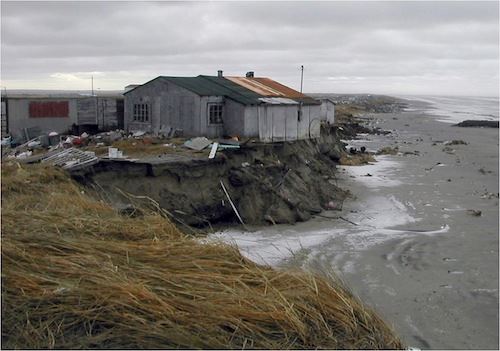Media registration open for climate displacement symposium
November 10, 2016
Lauren Frisch
907-474-5350

Media registration is now open for an upcoming symposium on the legal and policy issues associated with community displacement and relocation due to climate change.
The Symposium on Climate Displacement, Migration, and Relocation is scheduled for Dec. 13-14 in Honolulu, Hawaii.
It is one component of major new funding and programs announced in early September by the U.S. administration to address the critical need to build climate resilience. Symposium conveners include the White House Council on Environmental Quality, National Oceanic and Atmospheric Administration Office for Coastal Management, the Environmental Law Program of the William S. Richardson School of Law (University of Hawaii), the Alaska and Hawaii Sea Grant College Programs and the Pacific Islands Climate Science Center.
Residents in Hawaii, Alaska and the Pacific Islands are on the front lines of the impacts of climate change, and moving to a safer location is one of many adaptations that communities are considering. An upcoming symposium aims to address legal and policy challenges and questions surrounding climate displacement and relocation.
The effects of climate change, especially storms and sea-level rise, pose a grave and immediate threat to many communities in the Pacific. For some, relocation will ultimately be the only sustainable choice. The Symposium on Climate Displacement, Migration, and Relocation will address questions about migration and relocation for communities in the continental United States and the Pacific Islands.
As the climate changes, warming temperatures, increases in the frequency and intensity of extreme weather events, and coastal inundation have the potential to severely impact coastal communities worldwide. As the impacts of climate change become more pronounced, it is likely that more families will consider relocation.
At the local and national levels, Sea Grant is working to help communities stay in their homes by developing strategies to promote human health, livelihoods and economic development while building community resilience. However, in some cases, communities have made the decision that the only option is to move to safer ground.
In 2003, the U.S. Government Accountability Office estimated that most of Alaska’s 200-plus Native villages were affected by flooding and erosion, and a 2009 GAO report identified 31 Alaska Native villages that face imminent threats. At least 12 threatened villages have decided to relocate. Relocation has huge legal and policy implications for communities in Alaska and the rest of the United States, such as property rights of displaced individuals and communities, how relocation affects boundaries for reservations or Native corporation lands and tribal treaty rights, and how it affects subsistence harvest access.
The symposium will provide a platform for stakeholders, researchers, policy experts, indigenous leaders, and local, state, and federal government officials to explore legal and policy opportunities and challenges. It will address questions about how to plan for and implement voluntary migration and community-led relocation as adaptation strategies, both domestically and in the context of the Pacific Islands.
ADDITIONAL CONTACTS: Sue Keller, 907-474-6703, sue.keller@alaska.edu. Maxine Burkett, burkettm@hawaii.edu, 808-956-2865.
ON THE WEB:
Symposium on Climate Displacement, Migration, and Relocation web page: https://seagrant.uaf.edu/conferences/2016/climate-migration/
Obama administration's Sept. 1 announcement of policies to promote conservation and build resilience to climate change, with a focus on Pacific Islands.
NOTE TO EDITORS: Journalists who are interested in covering open sessions may register at no charge. Please contact Sue Keller at sue.keller@alaska.edu for the code to waive registration fees.


